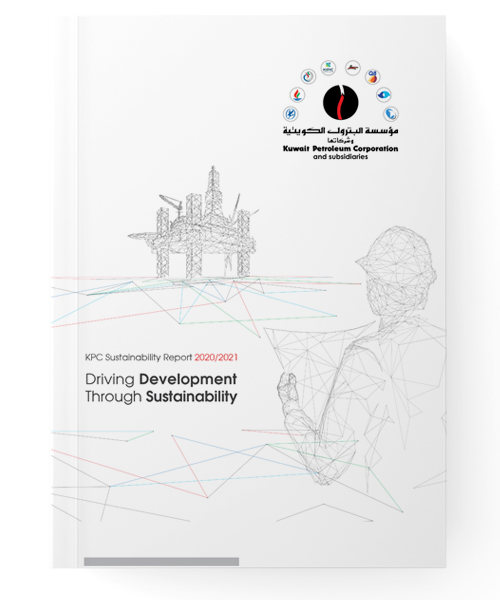A Sustainable Energy Future
KPC aims to achieve net-zero emissions by 2050, power lives, and care for our planet.
KPC is committed to achieve Net-Zero by the year 2050 by actively reducing scope 1 and scope 2 greenhouse gas emissions from our global operations and continuing to be among the least emissions-intense oil and gas producers. We will continue to be a responsible hydrocarbons producer, and we will drive sustainability within our operations with least greenhouse gas emissions. Our strategy draws a roadmap for energy transition to 2050 through various new energy businesses and growth opportunities. These include carbon capture, utilization, and storage (CCUS), gas flaring, biofuels, among others. KPC’s energy transition 2050 roadmap will enable the State of Kuwait to achieve its target of Net-Zero by 2060.

KPC's 11 Environmental, Social, and Governance Goals
KPC has developed its Environmental, Social and Governance (ESG) Strategy in line with the recent global trends of aligning businesses with sustainability goals, as well as achieving New Kuwait 2035 Vision.

We want to provide the lowest cost oil and lowest carbon intensity oil.
Nawaf S. Al Sabah
Chief Executive Officer
2nd of December 2022, Bloomberg Markets

Our vision is to supply energy resources at the lowest emissions intensity globally.
Nawaf S. Al Sabah
Chief Executive Officer
KUWAIT 2023, The Energy Year
Getting to Net Zero
By actively tackling climate change, implementing effective water management strategies, and embracing waste management practices along with the circular economy, and lowering emissions, we are steadily progressing towards achieving a net-zero future.
1. Addressing Climate Change
2. Water Management
3. Waste Management and Circular Economy
Our energy transition strategy draws a roadmap for future energy businesses and growth opportunities such as carbon capture and storage..., biofuels, and petrochemical recycling, among others.Nawaf S. Al Sabah
Chief Executive Officer
Helping in Powering Lives
Through prioritizing health and safety, fostering employee recruitment, development, and retention, promoting diversity and inclusion, as well as upholding human rights, we are actively contributing to empowering lives through sustainable power solutions.
1. Health and Safety
2. Employee Recruitment, Development and Retention
3. Diversity and Inclusion
KPC stands out for its high representation of female workers compared to other Middle Eastern NOCs. Female employees at KPC-HO make up 51% of the workforce, showcasing the corporation's commitment to promoting diversity, equal opportunity, and fair hiring practices.
4. Human Rights
Caring for Our Planet
Covers the structure through which a corporation is governed and led, its transparency and how environmental, social and governance is embedded in it.
1. Systematic Risk Management
2. Corporate Governance
KPC has a strong baseline in terms of corporate governance.
- Board of Director monitors effectiveness of environmental, social, and governance risks through risk committee.
- Sustainability Executive Committee in place.
- To ensure organizational independence, KPC Group Internal Audit function report functionally to the Board Audit Committee and administratively to the Chief Executive Officer.
- Corporate Governance framework has been developed by considering international best practices and guidelines such as organization for Economic Cooperation and Development.
3. Corporate Ethics
4. Local Content Value Creation
Sustainability Reports
.jpg)
Sustainability Report 2022-2023
KPC reaffirms its commitment to sustainable reporting by improving and upgrading its reporting mechanism year on year. This latest report shows our commitment to meeting specific KPMs that enhance our performance on ESG.
Download

Sustainability Report 2020-2021
Our commitment to sustainability reporting is closely aligned to KPC’s corporate vision, mission, and values. Through its commitment to sustainability reporting, KPC seeks to play a key role in meeting the objectives of the conceptualized vision of a New Kuwait.
Download

Sustainability Report 2018-2019
Our commitment to sustainability reporting is closely aligned to KPC’s corporate vision, mission, and values. Through its commitment to sustainability reporting, KPC seeks to play a key role in meeting the objectives of the conceptualized vision of a New Kuwait.
Download

KPC 2050 Energy Transition Strategy
Through our energy transition commitment, we are steadily progressing towards achieving a net-zero future.


.jpg)
